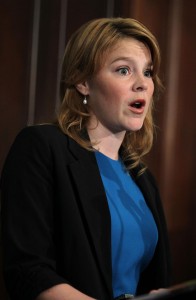We’re pleased to share this piece from Katie McAuliffe, Executive Director of Digital Liberty & Federal Affairs Manager at Americans for Tax Reform.
Given California’s precarious economic situation, it would seem unwise for the state to make its business climate any more difficult for those still choosing to operate there. However, the California Public Utilities Commission (CPUC) has chosen to persecute only one of the many prepaid wireless carriers in the state.
On July 11, 2013 a decision before the CUPC was handed down ordering TracFone to pay nearly $24.5 million to make up for user fees and public purpose program surcharges that were uncollected, despite previously declaring TracFone exempt from the charges. The CPUC disregarded clear evidence that prepaid wireless does not charge a monthly rate or know whether a call is inter- or intra- state like traditional telecommunications companies.
TracFone’s issue with CPUC stems from the fact that, unlike monthly subscription plans, prepaid wireless is a debit service, and thus cannot be not subject to fees in the same way as traditional telecommunications service providers. In California, companies that provide telecommunications services through monthly billing and subscription business models are required to remit a surcharge for intrastate services, such as a phone call from Sacramento to Los Angeles. However, TracFone does not operate lines of communication in the manner that traditional telephone operators do. Rather than owning cell towers and transmission lines, TracFone purchases the right to use and operate portions of cell towers and transmission lines owned by traditional telephone companies. Customers purchase handsets along with prepaid service for fixed amounts. After the purchase of debit services, there is no other interaction with consumers. TracFone has no way of know whether its customers are making intrastate or interstate calls.
The California Public Utilities Commission responded to a TracFone inquiry about these fees in 2003, and informed the company that its debit card services were exempt from remitting this charge. However, after TracFone applied to provide federally-subsidized services for low-income users in 2008, CPUC launched an investigation resulting in a reversal of its original position. The CPUC required TracFone to retroactively remit surcharges for intrastate calls, despite its previous stance and the fact that doing so is wholly incompatible with the prepaid business model.
 CPUC’s reversal of position is clearly an attempt by a cash-hungry government body to claim funds it has no right to collect. Requiring TracFone to collect surcharges on prepaid services like traditional telecommunications companies is not only in direct contrast to CPUC’s previous ruling on the issue, but also in violation of common sense. Companies who sell prepaid phone services do not know how much of those services are used for intrastate calls, and, in order for them to collect surcharges at the time of payment, consumers would inevitably be overcharged or undercharged. In fact, including the state fees in the cost of the prepaid minutes would result in illegal double taxation.
CPUC’s reversal of position is clearly an attempt by a cash-hungry government body to claim funds it has no right to collect. Requiring TracFone to collect surcharges on prepaid services like traditional telecommunications companies is not only in direct contrast to CPUC’s previous ruling on the issue, but also in violation of common sense. Companies who sell prepaid phone services do not know how much of those services are used for intrastate calls, and, in order for them to collect surcharges at the time of payment, consumers would inevitably be overcharged or undercharged. In fact, including the state fees in the cost of the prepaid minutes would result in illegal double taxation.
The California Universal Service program has its own issues, and currently legislators are working to bring the program under control. To ensure that the California legislature has control over what the CPUC does as far as tax increases, AB 1407 caps the amount of tax that can be charged. It seems that they have been scaling back expenditures in the program in since In 2010-11 the program was at $419,335,000 AC Adopted Budget and for 2013-14 the AC Adopted Budget is $278,753,000. With expenditures decreasing over the last few years, fees should be going down as well. Further oversight vested in elected officials will most likely encourage further decreases in program growth.
Proponents also claim that AB 1407 moves the program away from primarily funding landline phone services rather than wireless services. One of the problems is that California has a state Universal Service Fund in addition to the Federal Universal Service Fund. The CPUC has set up eligibility criteria geared towards wireline based services, so it was not until March 2011 that any wireless service was able to offer low-income California residents lifeline based services. It’s not clear that AB 1407 completely wipes those requirements off the books; however, AB 1407 does encourage expanding the program to newer services.
AB 1407, if passed, would at least bring the fund under legislative oversight; however, without the inclusion or passage of AB 300 the problem of USF tax collection for prepaid providers still exists, and that harms some of the most economically vulnerable citizens. For collection of these fees to be addressed in a workable manner that is not predatory towards businesses or consumers, the California Legislature should pass AB 300, which establishes a point of sale collection method for California Universal Service.

